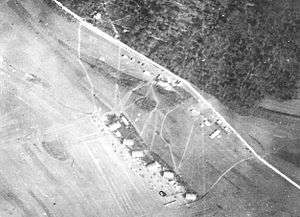Maulan Aerodrome
Maulan Aerodrome, was a temporary World War I airfield in France. It was located 0.2 miles (0.32 km) South-Southwest of the commune of Maulan, in the Meuse department in Lorraine in north-eastern France.
| Maulan Aerodrome | |
|---|---|
| Part of American Expeditionary Forces (AEF) | |
| Located near: Maulan, France | |
 Maulan Aerodrome, France. Note the six tent and frame hangars at the airfield, with the squadrons' DH-4s lined up in front. Trails made by vehicles in the field show the routes taken to the station area and personnel tents along the road to Maulan | |
 Maulan Aerodrome | |
| Coordinates | 48°39′57″N 005°14′37″E |
| Type | Combat Airfield |
| Site information | |
| Controlled by | |
| Condition | Agricultural area |
| Site history | |
| Built | 1918 |
| In use | 1918–1919 |
| Battles/wars | World War I |
| Garrison information | |
| Garrison | 1st Day Bombardment Group United States First Army Air Service |
Overview
A small airfield was set up in September, 1914 by the French "Aeronautique Militaire" at "Le Petit Maulan", but soon to be wrecked by a storm and given up.
Then, a French flying unit, escadrille F 25 (French 2nd Army) spent few months (31 March - 16 September) in 1917 at "Maulan" and again three weeks (14 March - 5 April) in 1918 as VR 25,[1] this time been "barracked", with seems to imply that an airfield had been organized at least early in 1918 in Maulan before the Air Service, United States Army squadrons arrived in the area, 2 miles further south from the initial spot of "Le Petit Maulan", at the west rim of the wood of Charmois.
After some works performed by a detachment of 484th Aero Squadron (Construct.) on 1–11 September, Maulan was used as a main operating base by the 1st Day Bombardment Group during both the St. Mihiel and Meuse-Argonne Offensives, with four squadrons of aircraft (11th, 20th, 96th and 166th) from 23 September onwards.
In support of the flying squadrons, the 4th Air Park's 648th Aero Squadron had a flight of mechanics for repair of both aircraft and vehicles. Also, the airfield was the home of Photo Section #12 for processing and analyzing aireal photography. The ground support station consisted of various aircraft hangars, support buildings and quarters for personnel, primarily in the woods to the north and west of the field.
After the armistice, the 1st Day Bombardment Group stayed there until 17 January 1919, when its HQ and three remaining squadrons[2] moved to Colombey les Belles to be demob'ed. The airfield was then soon returned to agricultural use.
The first airfield of "Le Petit Maulan" was 1/2 miles south of Maulan, along the RN 4, and the larger - as already said - was a further 2 miles south, by the wood of Charmois. Today, both are cultivated fields, with no indications of their wartime use.
Known units assigned
- Headquarters, 1st Day Bombardment Group, 25 September-11 November 1918
- 11th Aero Squadron (Day Bombardment), 24 September 1918 – 17 January 1919
- 20th Aero Squadron (Day Bombardment), 23 September 1918 – 16 January 1919
- 96th Aero Squadron (Day Bombardment), 23 September 1918 – 10 January 1919
- 166th Aero Squadron (Dau Bombardment), 25 September-22 November 1918
References
![]()
- it had changed its aircraft from Farman to Renault-powered Voisin
- 166th had already left to join the 3rd US Army Air Service at Joppécourt
- Series "D", Volume 2, Squadron histories,. Gorrell's History of the American Expeditionary Forces Air Service, 1917–1919, National Archives, Washington, D.C.
- Series "N", Volume 16, History of the Air Service AND Special Aviation Maps AND Station Lists for Air Service Units, Oct-Dec 1918